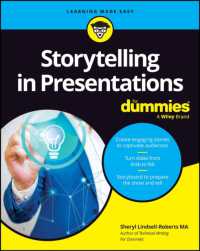- ホーム
- > 洋書
- > 英文書
- > Science / Mathematics
Full Description
Personal physician of the emperors Marcus Aurelius, Commodus and Septimius Severus, Galen was a multi-faceted intellectual and his extensive writings, constitute, by far, the largest surviving corpus of any ancient author. This immense corpus is still not fully explored and continues to surprise scholars and to offer the possibility of new discoveries.
This volume provides the first comprehensive analysis of his fierce critique of atomism, which is the most emblematic and disputed example of his polemical accounts, and demonstrates his reliability. It offers a close analysis of Galen's account on atomism, contributing to the current debate on his role as a source on previous and contemporary philosophical and scientific thought, shedding new light on the still little-known relationship between Epicureanism and medicine. It additionally offers a new perspective on the debated question of the philosophical background of Asclepiades' medical corpuscularism.
Galen on the Atomists will appeal to students and scholars alike in Ancient Philosophy, Classics and History of Ideas, as well as those studying history of science and medicine.
Contents
Part One: Galen's Design Argument vs. Epicurean Evolution in De usu partium
Chapter 1
Genesis, Date and Aftermath of Galen's De usu partium
Chapter 2
Galen and anatomy as evidence for Nature-demiurge's provident design
Chapter 3
The Epicurean theory of adaptation and the case of hand tendons in Galen's De usu partium
Chapter 4
Two Notions of Suitability: Lucretius on suitable and monstrous bodies, and their adaptation by extinction
Part Two: Galen on Particles in De elementis secundum Hippocratem
Chapter 5
De elementis, date and contents
Chapter 6
Indivisibility and Immutability of the Atoms in De elementis
6.1 Galen's Use of ἕν and his Description of the Democritean Atom as an Eleatic One
6.2 The Properties of the Atoms and the Overlap between Ancient Atomism and Epicureanism in Galen's De elementis
Chapter 7
The Reception of Atomism in the Late Authors. The Case of Galen's De elementis
Chapter 8
Galen against atomic impassibility. The ‛needle argument' and its backgro
8.1 Cicero's Account
8.2 Plutarch's Testimony in Adversus Colotem
Part Three: Atoms or Molecules? The Nature of Asclepiades' ὄγκοι and the Background of his Flux Theory
Chapter 9
Nature and meaning of Asclepiades' ὄγκοι
Chapter 10
The ancient testimonies on the nature of Asclepiades' ὄγκοι
10.1 Galen's account
10.2 Sextus' account
10.3 Caelius Aurelianus' account
10.4 Calcidius' account
Chapter 11
Asclepiades' flux theory and the Epicurean doctrine of emanations
Chapter 12
Asclepiades and Lucretius on Pathology
Conclusions
Bibliography








